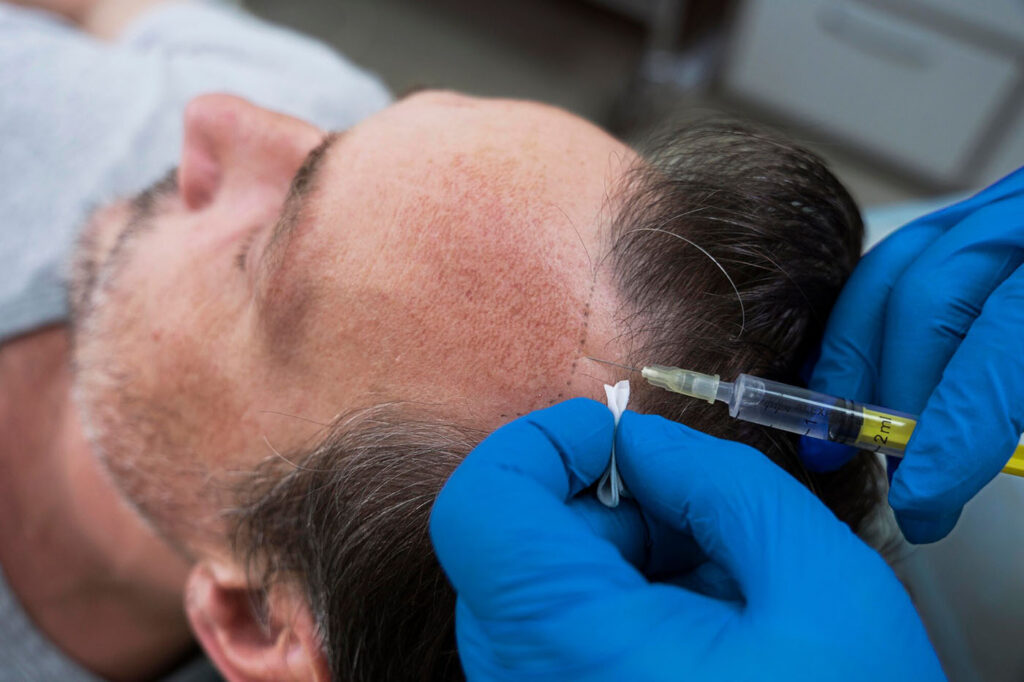The Heart of the Problem: The Hair Cycle and Stem Cells
To understand the importance of this discovery, let’s briefly recall how our hair’s life cycle works. Each hair goes through three main phases:
- Anagen: The active growth phase, which can last for years. 90% of your hair is currently in this phase!
- Catagen: A short transitional phase where growth stops.
- Telogen: The resting phase, at the end of which the hair falls out to make way for a new one.
Who are responsible for restarting this cycle over and over again? The Hair follicle stem cells (HFSCs). These cells are like starter motors: they remain dormant during the resting phase and then activate to signal the start of a new growth phase (anagen), regenerating the follicle and producing a new hair.
What is MCL-1 Protein and Why is it So Important?
Researchers from Australia, Singapore, and China have discovered that the MCL-1 proteinis an essential piecein this activation process. Its main function is to protect hair follicle stem cells (HFSCs) at the critical moment when they “wake up” or activateto initiate the growth phase.
The MCL-1 protein is crucial for the survival of hair follicle stem cells (HFSCs) when they are activated to initiate the growth (anagen) phase of the hair. Without enough MCL-1, these activated stem cells die, preventing hair regeneration.
We could say that MCL-1 acts as a “bodyguard” for these important cells, ensuring they survive the stress of transitioning from a state of rest to a state of high metabolic activity, which is the beginning of growth.
What Happens When MCL-1 Is Missing? Study Evidence
Scientists conducted experiments on mice to understand the exact role of MCL-1. They observed that:
- Mice genetically modified not to produce MCL-1 in their hair follicles grew hair normally at first.
- However,Over time, they suffered progressive hair loss.The reason? The stem cells (HFSCs) were able to activate, but died shortly afterward due to the lack of MCL-1 protection.
- Furthermore, if hair was removed from these mice (simulating hair removal or damage), they were unable to regenerate it, confirming that without MCL-1, the cycle could not restart correctly after the resting phase or a stimulus.
These results conclusively demonstrate that MCL-1 is essential for keeping activated HFSCs alive and, therefore, for the continuity of the hair cycle and hair regeneration.
The Delicate Balance: MCL-1 vs. Cellular Stress (Protein P53)
Our bodies have very sophisticated control mechanisms. One of them involves the protein P53, known as “the guardian of the genome.” When a cell experiences stress or damage (as HFSCs can experience when activated), P53 can induce programmed cell death (apoptosis) to prevent further problems.
The study suggests that MCL-1 (which belongs to the BCL-2 family of proteins, regulators of cell life and death) acts by counteracting the pro-death action of P53 in activated HFSCs. It’s a delicate balance: MCL-1 protects, P53 keeps watch.
Interestingly, when the researchers also eliminated the P53 protein in the MCL-1-deficient mice, hair was able to regrow! This confirms that both proteins work in a kind of tug-of-war to decide the fate of these crucial stem cells.
A Promising Molecular Pathway: The ERBB Pathway
Future Implications: What Does This Mean for the Fight Against Alopecia?
This discovery is more than just a scientific curiosity. It has very relevant implications:
- Better Understanding of Alopecia:It could explain why, under certain conditions (perhaps in some types of Alopecia Areata, chronic effluvium, or even hair aging), hair does not regenerate properly. This could be due to problems with MCL-1 levels or the MCL-1/P53 balance.
- New Therapeutic Targets: Opens the door to the development of new treatments for hair loss. Drugs or therapies could be investigated that:
- Increase MCL-1 levels or activity in follicles.
- Inhibit the excessive action of P53 in HFSCs.
- Modules the ERBB signaling pathway to protect stem cells.
- Personalized Medicine: In the future, it may be possible to measure the activity of these proteins in individual patients to offer more targeted treatments.
- Advances in Hair Regenerative Medicine: Provides fundamental knowledge for therapies that seek to regenerate hair follicles or improve their function.
D'Atri Hair Medicine: At the Forefront Today, Looking to the Future
At D’Atri Medicina Capilar, we celebrate these scientific advances that shed light on the complex mechanisms of hair growth. While treatments based specifically on the modulation of MCL-1 or P53 are still in the field of future research, this knowledge reinforces the importance of what we do today: caring for the health of the hair follicle and its environment.
Our commitment is to always be up-to-date, but above all, to offer you today the best diagnostic and therapeutic tools available and validated:
- Precise Diagnosis: We use digital trichoscopy and our clinical experience to identify the root cause of your hair loss, evaluating the health of your follicles.
- Current Effective Treatments: We offer therapies such as Platelet Rich Plasma (PRP) Capillary and Hair Mesotherapy, which seek to nourish, stimulate, and protect existing follicles, creating the best possible environment for their function and acting on the cellular health that research like this shows to be so crucial.
- Definitive Solutions: For cases of permanent hair loss, the FUE hair implant technique remains the gold standard for hair restoration.
A Brighter Future for Hair Health
The discovery of the essential role of the MCL-1 protein is, without a doubt, excellent news and a significant step in the understanding of hair growth. It reminds us that science is constantly advancing, offering new hope for those facing alopecia.
While we wait for this research to translate into new clinical treatments, it is essential not to give up. The key today remains an early and accurate diagnosis by specialists, and the application of effective treatments that already exist to preserve and improve the health of your hair.
Are you worried about your hair loss?
Don’t wait for the therapies of the future to take action. At D’Atri Medicina Capilar, we offer expert diagnosis and personalized treatments with the technology and knowledge available today. Consult us for an evaluation and discover how we can help you take care of your hair’s health!

